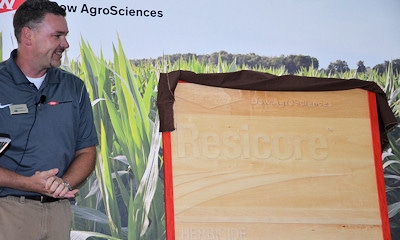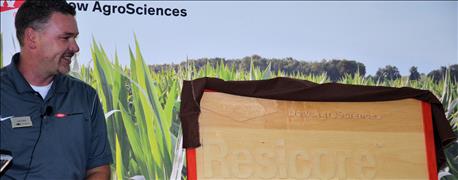
Bill Johnson typically spends a fair amount of time discussing ‘what’s new in herbicides’ during his talks to farmers. He’s taking a different approach this year. He spoke exclusively to Penton Agriculture about what he’s emphasizing this winter instead. Here is a portion of that interview.
What new herbicides are you talking about now?

NEW NAME IN WEED GAME: Luke Peters of Dow AgroSciences officially unveiled the name of its’ newest herbicide, Resicore, at a field day last July. Resicore recently was labeled by EPA. It contains three active ingredients- all have been on the market before, just not sold together in one formulation.
Johnson: There really isn’t any new chemistry to talk about. There are some tweaks in formulation and combinations, but we pretty much have the same herbicides to begin this season as we had before. You always need to check labels for possible changes in formulation, use rate and precautionary statements. Even then, it’s a very short list of things that have changed.
Dow AgroSciences just received registration for Resicore herbicide. We saw it in their plots last year. Isn’t it a new herbicide?
Johnson: It’s not new chemistry. Dow describes it as having a novel formulation with three leading active ingredients with three distinct modes of action. It will be a soil-applied residual herbicide for corn.
The three active ingredients have been around a while – acetochlor, mesotrione and clopyralid. This herbicide combines them into one product. It does not have glyphosate or atrazine in it, so it’s an option where resistance to those herbicides occurs, or where growers are looking for a non-atrazine herbicide. Dow AgroSciences says it can be applied preplant to early postemergence.
Related: Resicore: New residual corn herbicide announced
When someone mentions new herbicides, many people want to talk about new products for application over crops with a resistant trait to those herbicides. Why aren’t you talking about them much?
Johnson: Whether or not several new herbicides could be applied post on resistant corn or soybeans was unclear when I had to decide what topics to emphasize this winter. I elected to say very little about trait-related herbicides since they’re either not approved or don’t have export approvals. I felt there were more pressing issues farmers should address. We have almost a decade of experience working with these systems in research plots. When these systems are approved, will talk about them and help growers determine how they fit into their weed control systems.
What products fit in this category?
Johnson: These herbicides include Enlist Duo from Dow AgroSciences, Xtend from Monsanto and Engenia from BASF and Balance Bean from Bayer. Syngenta is also developing an HPPD-resistant bean as well. Enlist Duo was labeled for Enlist corn in Indiana in 2015, but EPA revoked labeling due to concerns over endangered species brought by environmental groups.
Dow AgroSciences believes Enlist Duo will be cleared for corn before planting, but it hasn’t happened yet.
Do you think these products will eventually be available for growers?
Johnson: Yes, I believe many or all of these products will likely get approval at some point. The question is when. Many of the active ingredients in these products have been used successfully for decades. It seems logical that they would be approved at some point.
Can you expand on what Syngenta is doing?
Johnson: Syngenta is working on a herbicide to apply over Callisto-resistant soybeans. We are working with it in our plots. It may be farther down the road.
About the Author(s)
You May Also Like




